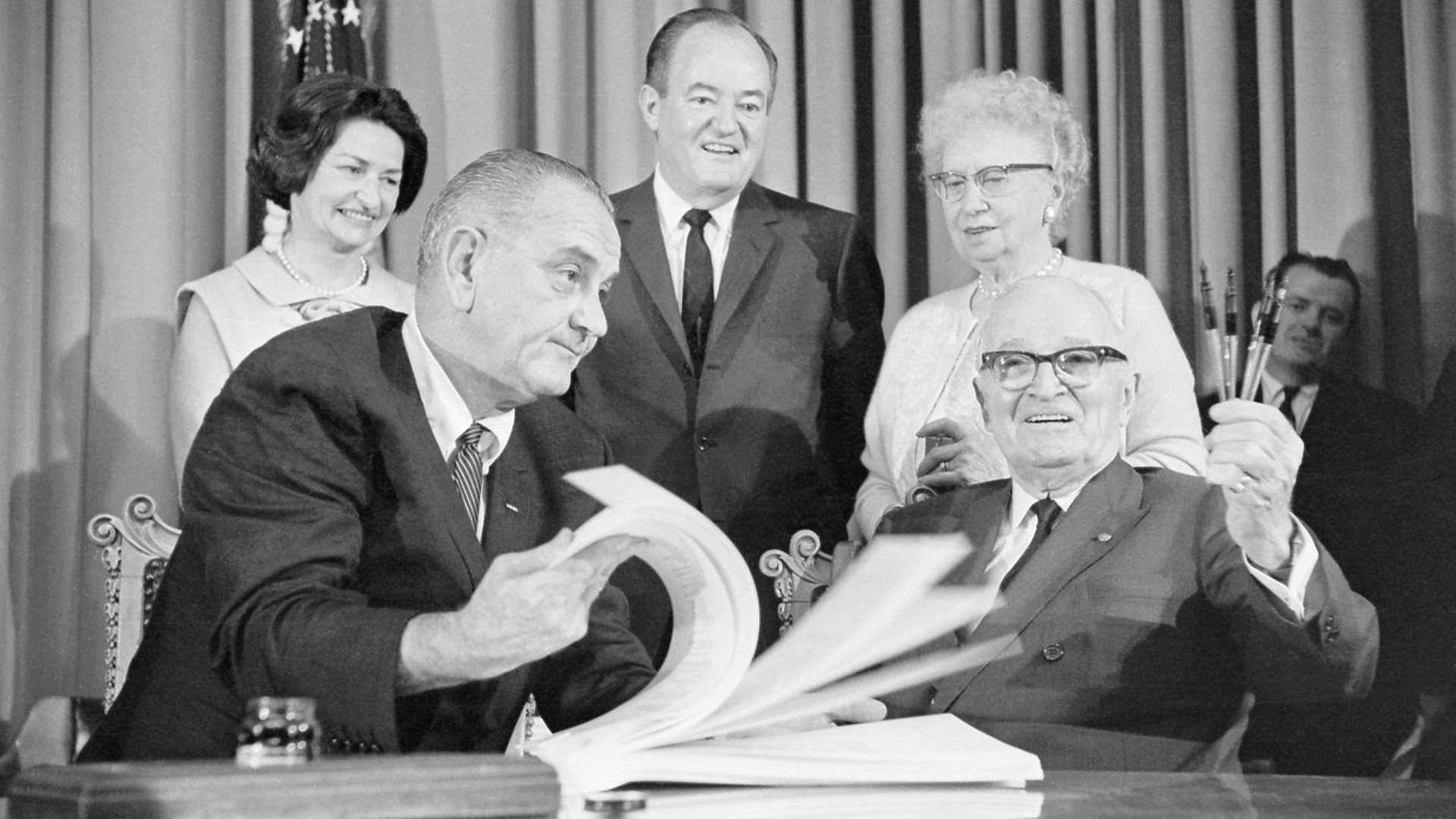Medicare and Medicaid: A New Chapter in American Care

President Lyndon B. Johnson signs the Medicare and Medicaid Act next to former President Harry Truman.
What Happened?
The idea began in 1945, when President Harry Truman asked Congress to pass national health insurance. His plan was blocked by opponents who shouted about 'socialized medicine.' But the need never went away. As America aged and hospital costs soared, older adults were left behind—uninsured, unaffordable, and increasingly invisible to the private insurance market.
By the 1960s, over 17 million Americans were over 65, but only a fraction had health coverage. Private companies deemed seniors too risky. With public pressure mounting, Congress finally passed the Social Security Amendments of 1965.
President Lyndon B. Johnson flew to Independence, Missouri to sign the bill at the Truman Library, honoring the man who first tried. At the ceremony, Truman became the first Medicare recipient and received card #1. His moment had come, two decades later.
Medicare guaranteed hospital and medical insurance for people over 65. Medicaid provided health coverage for low-income families. Funded by payroll taxes and federal-state partnerships, these programs enrolled nearly 20 million people in just their first three years.
Later expansions extended coverage to people with disabilities and those with end-stage renal disease. In 2003, prescription drug coverage was added. Over time, the programs grew into lifelines—touching nearly half the U.S. population.
The 1965 signing marked a turning point. It was a statement that care for the vulnerable was a national responsibility, not an individual burden. Medicare and Medicaid didn’t just patch a hole in the system. They stitched together a new social contract.
Why It Matters
Medicare and Medicaid reshaped the fabric of American life. They recognized that growing old or being poor shouldn’t mean being left behind. These programs remain powerful symbols of what government can do when compassion meets courage. In a country still struggling with health care access, their legacy reminds us that dignity and health are worth fighting for—and protecting.
?
Why did President Lyndon B. Johnson choose to sign the Medicare and Medicaid Act at Harry Truman’s presidential library?
What were the main arguments used by critics who opposed national health insurance in the 1940s and 1960s?
How did Medicare and Medicaid change the way older and low-income Americans access health care?
What role did public pressure and social movements play in the passage of the 1965 Social Security Amendments?
How have Medicare and Medicaid evolved since their creation—including expansions to include people with disabilities and prescription drug coverage?
Why is health care often such a controversial topic in American politics, especially when it comes to government programs?
How do Medicare and Medicaid reflect broader debates about the role of government in providing social services?
What would health care in the U.S. look like today if these programs had never been created?
Dig Deeper
A commemorative look at the legacy and impact of Medicare and Medicaid, featuring reflections from historians and public health experts.
From Truman’s dream to Johnson’s signature—this video traces the journey of Medicare and how it grew into one of the most important public health programs in U.S. history.
Related

Life and Society in the Colonial Carolinas
Explore the rise of plantation agriculture, slavery, class divisions, and the shaping of daily life in the colonial South—particularly in North Carolina and South Carolina.

Indian Removal and the Trail of Tears
In the 1830s, the U.S. government forced thousands of Native Americans—including the Cherokee—off their ancestral lands, leading to a deadly westward march known as the Trail of Tears.

Joint-Stock Companies: Capitalism, Colonization, and Risk
Without joint-stock companies, there might be no Jamestown, no thirteen colonies—and no United States. These early capitalist ventures let investors fund risky New World settlements without bankrupting the Crown.
Further Reading
Stay curious!
